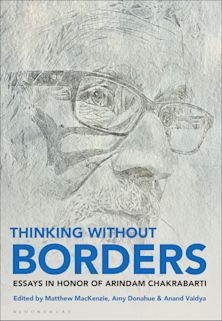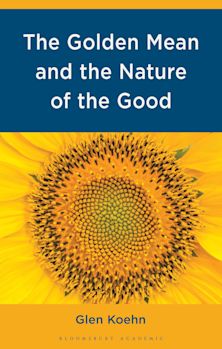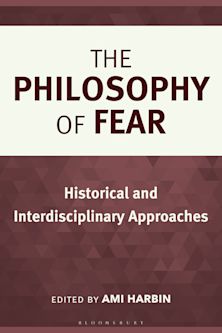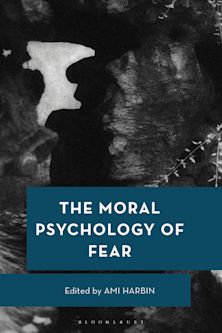- Home
- ACADEMIC
- Philosophy
- Ethics and Moral Philosophy
- Menkiti’s Moral Man
You must sign in to add this item to your wishlist. Please sign in or create an account
Description
In Menkiti’s Moral Man, Oritsegbubemi Anthony Oyowe offers an original interpretation of Ifeanyi Menkiti’s conception of person, one that has significant implications for his metaphysics and moral philosophy. Menkiti holds that one is not born a person but becomes a person in a linguistic and cultural community, denies that the mere possession of intrinsic properties makes one a person, and maintains that personhood is defined by the community. This last process consists in the community socially recognizing as person one who has been incorporated into society and has successfully carried out a range of obligations linked to social roles and positions. On the one hand, Oyowe clarifies the role of intrinsic properties in Menkiti's account by arguing that for Menkiti, moral agency and personhood do not coincide. One is a moral agent but not a person in virtue of being rational, free, and endowed with a moral personality. On the other hand, he clarifies the sense in which the community makes one a person by drawing on principles of social ontology to explain how by adopting certain attitudes and practices a community constitutes its members as persons.This interpretation has the potential to illuminate a range of problems raised in response to Menkiti’s conception of person.
Table of Contents
Chapter 1: The Making of a Person in Community
Chapter 2: Agency, Practical Reason, and Autonomy
Chapter 3: Moral Status and Communities of Respect
Chapter 4: Social Architectures of Personhood and the Politics of Exclusion
Chapter 5: Coincidence, Conventionalism, and the Idea of Soft Person
Chapter 6: Ontology, Realism, and the Persistence of Ancestral Persons
Conclusion
References
About the Author
Product details
| Published | 14 Mar 2022 |
|---|---|
| Format | Ebook (PDF) |
| Edition | 1st |
| Extent | 224 |
| ISBN | 9781978779419 |
| Imprint | Lexington Books |
| Series | African Philosophy: Critical Perspectives and Global Dialogue |
| Publisher | Bloomsbury Publishing |
About the contributors
Reviews
-
This is not only an excellent introduction to the thought of the great philosopher Ifeanyi Menkiti but also an important contribution to philosophy in general. This book makes us reconsider some of our basic assumptions about who we are and is therefore relevant to all of us.
Boike Rehbein, Humboldt University
-
Although Ifeanyi Menkiti did not write much philosophy, what he wrote has called for much writing in response. His influential views on personhood, community, and ethics now receive book-length treatment in Menkiti’s Moral Man by Oritsegbubemi Anthony Oyowe. Oyowe’s monograph stands as the most careful, comprehensive, and sympathetic analysis of these themes in Menkiti’s oeuvre. Of particular interest is Oyowe’s defense of the core of Menkiti’s position from objections about its implications for the treatment of women and animals.
Thaddeus Metz, University of Pretoria, Professor of Philosophy (Research Focus)
-
This book has done a lucid comprehensive exposition of the significant threads and implications of Menkiti’s African communal normative conception of ‘personhood’ and the various criticisms leveled against it. Oyowe provides trenchant responses to these criticisms by arguing cogently for a plausible interpretation, which highlights the conceptual resources and philosophical underpinnings of Menkiti’s conception that render it immune to these criticisms. An Impressive work!
Polycarp A. Ikuenobe, Kent State University
-
'To advance our understanding of ourselves as persons in community,' is what Oyowe sets out to do here, and he does so by means of dense discussions and multilayered re-readings of Menkiti’s work on personhood in the context of one of African philosophy’s most globally appealing debates. Oyowe, a sharp-thinking and intellectually versatile philosopher of the younger generation, engages deeply and flexibly with the wide-ranging conceptual field that Menkiti and his peers and critics have long shaped. Grounded in African philosophy, this book goes far beyond.
Kai Kresse, Leibniz-Zentrum Moderner Orient (ZMO)
-
The maxim that a person is a person because of other persons appears to be a common ethical thread in most African communities. Ifeanyi Menkiti was among the first African philosophers to give this axiom a philosophical grounding in his seminal essays. Yet his thinking about it raises a few questions. In this brilliant, tightly argued work, Oritsegbubemi Anthony Oyowe fills in some of the missing links in Menkiti’s thought. In so doing, he expands our understanding of what it means to be human today. His work, which is richly informed by his extensive knowledge of African literature, has woken up the dormant thinker in me. I am sure it is going to do the same for many readers, philosophers or not. This is a timely work. I cannot praise it too much.
Chielozona Eze, Northeastern Illinois University
-
At one level, Menkiti’s Moral Man discharges an intellectual duty, long overdue, which Africa’s philosophical community owes one of its founding giants. Oyowe offers a rigorous, systematic, and sympathetically critical reconstruction of Menkiti’s highly influential if contested conception of the person. He extracts and elaborates aspects of personhood that remain underdeveloped in Menkiti’s own work, such as the moral status of women or persons’ duties to non-persons. But Menkiti’s Moral Man is much more than a philosophical exposition of Menkiti’s thinking. Oyowe ranges freely across African and Western theories and modes of reasoning, displaying a lightness of style and seriousness in argument in equal measure. In showing that and how Menkiti’s work can resonate across philosophical traditions Oyowe also shows himself to be a first-rate philosopher. Reading Menkiti’s Moral Man gives one joy: it gives one confidence in the future of (African) philosophy.
Katrin Flikschuh, London School of Economics and Political Science

ONLINE RESOURCES
Bloomsbury Collections
This book is available on Bloomsbury Collections where your library has access.



































